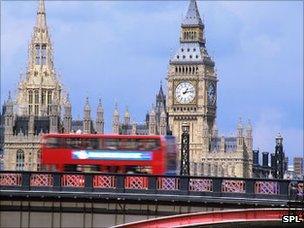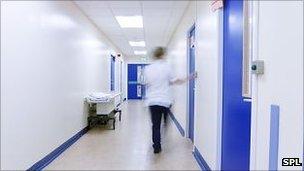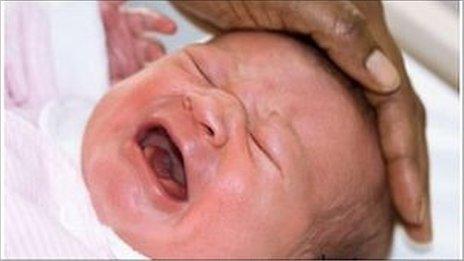Why closing hospitals is good for your health
- Published

Stroke services have been revamped in London
Decisions about closing - or moving - hospital services are always controversial. But there is mounting evidence that such changes can actually improve care and save lives.
Every hour someone in London has a stroke - but in many ways they are the lucky ones.
It is now widely acknowledged that the city is probably the best place in the world to have one.
And it is all because some services were shut down.
The capital's stroke care was overhauled in early 2010. Instead of being spread across 30 hospitals as they used to be, services are now centralised on eight "super sites".
It has meant patients get fast, 24-hour access to the best care and is expected to save 400 lives a year.
If a stroke is suspected, a patient is immediately taken to one of the eight centres. There they are assessed by a stroke specialist and given a brain scan within 30 minutes of arrival.
This allows medics to ensure the patients receive the right treatment in time.
For example, 15% of stroke patients need clot-busting drugs to restore blood flow to the brain within hours of the stroke. In London, virtually all of them get it.
Indeed, six of the eight units have been given the highest grade possible by inspectors. Across the rest of the country just one in 13 units have been given that rating.
Tom Greenwood, head of London operations for the Stroke Association, says: "I think there is evidence to suggest that the system in London is world-leading.
"Patients tell us they are amazed by how seamless and integrated it is - it really has made services better."
Risk for patients
But it is not just stroke care that can benefit from such a redesign.
The King's Fund has argued a whole host of specialities would benefit from being delivered from fewer sites.
In a report published earlier this year, the think-tank highlighted A&E, maternity, neonatal and heart services in particular.
Researchers said without such measures, patients could be put at risk.
The argument has been put forward by other bodies too.

A wave of new hospital developments have happened in the past decade
The Royal College of Surgeons has said emergency departments should not be providing services to population of less than 300,000 to ensure expertise is not spread too thinly.
At the moment the north east has an emergency department for every 150,000 people. The north west and London fair little better.
Similar arguments have been put forward for maternity care by the Royal College of Obstetricians and Gynaecologists and child heart surgery during an official NHS review by local health bosses.
But these steps come at a price - the closure of individual hospital departments or, sometimes, entire centres.
'Attachments'
For example, the review of child heart surgery said between four and five units needed to stop doing surgery to ensure doctors carried out enough operations to keep their skills up.
This suggestion has ignited local campaigns to save the threatened units, with one even winning the right to challenge the proposals through the courts.
It is this sort of backlash which makes overhauling hospitals such a difficult step.
Despite the strong case that can be often put forward, the public feel attached to their local hospital.
And, as a result, politicians have shied away from publicly backing the case for change - even though centralisation of services often saves money by making the health service more efficient.
Hospitals have been the visible face of the NHS ever since it was created. This was cemented in the 1960s which saw the network of district general hospitals expanded to every corner of the country.
And it has been further reinforced by the use of PFI since the 1990s which has used private money to build or refurbish over 100 hospitals.
But Mike Farrar, chief executive of the NHS Confederation which represents health managers, says this attachment to hospitals can often get in the way.
He had experience of two major reconfigurations when he was head of the North West Regional Health Authority - one involving the closure of an A&E unit and the other the overhaul of maternity care in the Greater Manchester.
"The problem is you get everyone on board and agreed to the idea, but then when it is their local unit under threat a local campaign gets underway and it makes it more difficult than it should be.
"It means we spend years going though the arguments for change and sometimes can't do the very thing that will benefit patients."
- Published14 July 2011

- Published3 March 2011
- Published25 February 2011